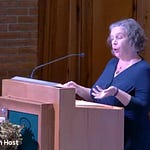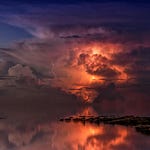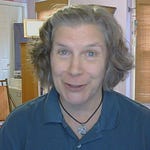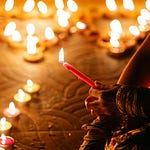You don’t expect the floor to give way. One moment, you’re steady – held by beliefs that have carried you for years. And then, something breaks through: a question, a conversation, a moment of clarity you didn’t ask for. The house shifts. Cracks. Tilts. Suddenly, everything is sideways, and the ground beneath you no longer feels safe.
That’s what the dark night of belief can feel like. Not just the loss of a worldview, but the disorientation of sitting inside what remains, staring at what once felt solid, wondering who you are now… and what, if anything, can or should be rebuilt.
Part of you longs for what was. Not for the belief itself, maybe, but for the sense of safety and warmth it offered. The sense of belonging. The easy rhythm of shared language and familiar rituals within a community.
When we lose that kind of structure, our instincts kick in. Just like we reach for a railing when we’re off balance, we reach for certainty when our inner world starts to shake. We instinctively try to resolve the dissonance – grabbing for anything that promises coherence: an explanation, a label, even a belief system that feels sturdy enough to hold us again.
And when our beliefs are woven into our identity – into family, faith, or political life – changing them doesn’t just shift what we think. It shifts who we’re seen to be. And that can feel like betrayal, not just to others, but to ourselves.
The pressure to return to what was can be subtle: a raised eyebrow, a silence that stretches just a little too long.
Or it can be direct. Very direct. Take, for instance, Galileo.
Galileo knew what he saw through his telescope: the Earth wasn’t the center of the universe. But this wasn’t just a scientific discovery, it was a theological disruption. His observations threatened how Scripture was interpreted, how authority was structured, how the universe – and humans place in it – was understood.
So he was told to recant. Not because he was wrong, but because what he was saying was disruptive to the system.
He knew the truth, but the cost of speaking it was exile.
That’s what so many of us fear – not just being mistaken but being cut off for being right.
When you’ve come to believe something new – through experience, study, or soul-searching – others may not merely question your ideas. They may question your motives and morals.
“You’ve changed,” they’ll say, as if that alone discredits you. Or they’ll question your faith. Or your patriotism.
Not because you’ve abandoned them, but because those values were tangled up in the belief you’re now reexamining.
The belief may not have been central to your faith or your love of country. But to others, they may feel inseparable. And when that belief shifts, everything around it feels suddenly unstable.
The belief that the earth was the center of the universe wasn’t the foundation of the Church, although it may have felt like it was. Even so, the Catholic Church eventually embraced the truth and survived. It adapted. It kept evolving. But at the time, change felt threatening because it challenged the story people told themselves about who they were, and why they mattered.
That still happens today. When you change, it can feel like you’re pulling on a thread that unravels someone else’s sense of stability. And in response, you may be tempted to make others comfortable again. To stay quiet. To pretend you didn’t see what you saw.
But the dark night doesn’t just ask for courage. It asks you to risk being misunderstood, which can be difficult, I know.
So what can we do with the ache to belong … and the truth we can’t unknow?
We can resist the urge to rebuild our house of beliefs too soon. We can resist the pull to patch over uncertainty just to restore peace.
The dark night of belief is not a failure. It’s a passage. A sacred pause between what has crumbled and what has not yet taken form.
Wait. Listen. Let the silence do its work.
What emerges may not be the house you had. But it may be something more honest, something that can hold the truth about who you are now.
There will be time to rebuild but, for now, it’s okay to let the ground settle first.
In this stillness, love is present:
The love that honors your unfolding self.
The love that holds space for others, even when they don’t understand.
And the Infinite Love that whispers through the mystery—
I see you, I know you, I am with you.
You may not know what to believe right now.
But as you sit in the unknown, you can still choose love.
Joni Miller, Ph.D. is a writer, researcher, spiritual coach, and speaker who uses her knowledge, education, and love of all things spiritual to help spiritual wanderers find a place they can call home, navigating by the light of Love.
Photo by Roberto Nickson: https://www.pexels.com/photo/moonlight-on-a-dark-sky-2885320/












